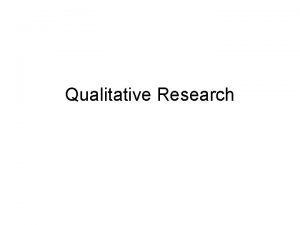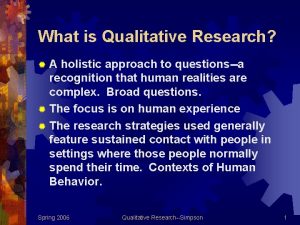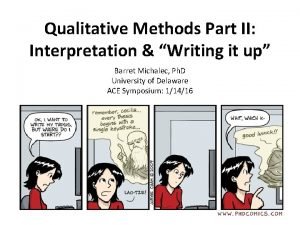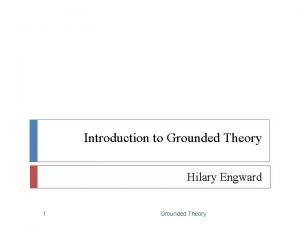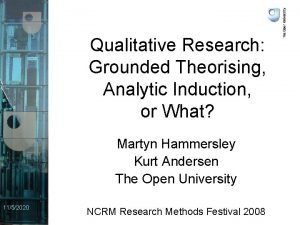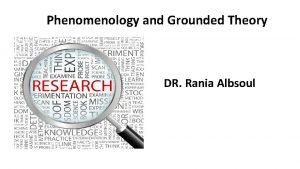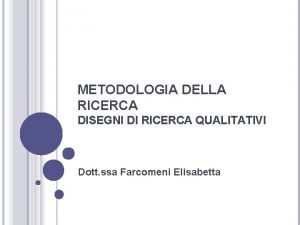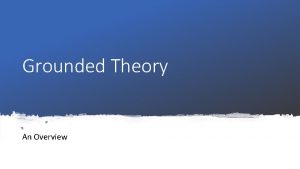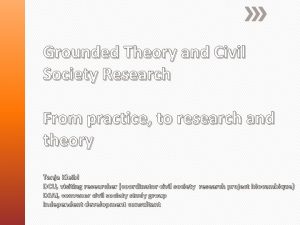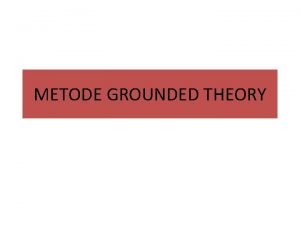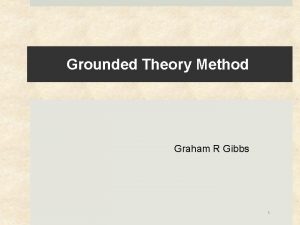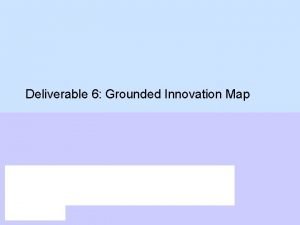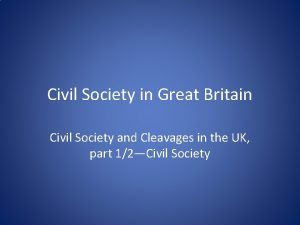Grounded Theory and Civil Society Research From practice












- Slides: 12

Grounded Theory and Civil Society Research From practice, to research and theory Tanja Kleibl DCU, visiting researcher (coordinator civil society research project Mocambique) DSAI, convener civil society study group Independent development consultant

Overview: 1. A brief introduction 2. Why Grounded Theory in civil society research? 3. Advantages and challenges 4. How to operationalize a grounded theory process?

1. A brief introduction: Grounded Theory & Situational Analysis Glaser & Strauss, The discovery of Grounded Theory (GT) (1967): A methodological revolution! - Glaser: rigorous codified methods, from codes to categories and theoretical concepts (structure) - Strauss/Corbin: notion of agency, social meanings, problem-solving practices (process) - Charmaz: social/cultural context, interaction, joint interpretive understanding of data - Clark: GT aftter the post-modern turn! Integration of reflection about power, discourse and social order. Research mapping. (structure/positions & process) Commonality: Inductive Research

2. Why grounded theory in civil society research (1/2) - Civil society is a contested and ambigious, eurocentric concept. GT helps you to work through complexities, different meanings up to contradictions encountered during field work. - Civil society research in a post-colonial context requires much more relf=reflectivity than usually allowed by short, time-bound, research projects. - Post-development and beyond aid debates demand indigenous knowledge and alternative processes of knowledge production.

2. Why grounded theory in civil society research (2/2) - Normative and positivist approaches lose relevance as increasingly civil society space for legalized Western-type NGOs is curtailed and local forms of hidden and invisible resistance develop. How to understand these new processes and movements and work with them towards social jutice? - Theoretical sampling allows for the engagement with new actors and dynamics that have been unknown or seemingly irrelevant to the research theme at the beginning. - At the end – GT (seen as a non-normative empirical process) helps you to question key assumptions about how development is understood and hence open avenues to make ‘alternative social worlds’ visible. It is about ‘decolonizing’ knowledge.

3. Advantages and challenges (1/2) Advantages Challenges GT helps to understand social, genderspecific and political phenomeno, as well as discurses and social structures. If you are confronted with an inexplicable problem GT might help you to understand it. GT is better applicable for long-term studies & less useful for short-term evaluations. GT can faciliate the development of theories of change using an actor perspective. Works well in preparation for or during country strategy paper development The open research process – from research theme to research question entail the problem of ‘losing’ your topic. GT offers a variety of methods which can be applied depending on context (interviews, literature review, memos, focal group discussions, media analysis, observations, etc…) How to know which method to take?

3. Advantages and challenges (2/2) Advantages Challenges Theoretical sampling facilitates the development and deepening of theory construction. Difficulty to plan for concrete research locations and number of research participants – timing can be a challenging as many aspects can only be clarified as part of the research process. Open research design and sucessive focusing of the research question allow for real ‘suprises’ to emerge, e. g. new actors, institutions, discourses and include them systematically into the research process and analysis. GT is less applicable for individual research – ideally research should be conducted in groups or at least data analysis be done with others. Investigator triangulation becomes particularly imporant if your research is done in a different cultural context than yours.

4. How to operationalize a grounded theory process? Theory of Change Focused coding and categorizing, focusing of research question Initial Coding Data collection Recruitment & sampling of participants Broad research question/theme Social arena/postional maps

4. Mozambique research example: Postional Map, Civil society and collective action Consensual/ democratic Stuctural: Third sector, public sphere Missing position Peaceful/ civil Violent/ uncivil Invisible society: Witchcraft/ sorcery Hidden politics: Formal/ Informal Hierachical/ traditional

Looking for practical guidelines? ACT Alliance/Bread for the World: A methodological guide for country civil society assessments: Unpacking the local meaning of civil society, its capacity and potential for enhancing social change (work in progress…)

QUESTIONS?

Further reading: - Charmaz, C. (2014): Constructing Grounded Theory. Sage. - Clark, A. (2005): Situational Analysis: Grounded Theory after the Postmodern turn. Sage. - Clark, A. et al (2015): Situational Analysis in Practice. Mapping Research with Grounded Theory. Left Coast Press Inc. (includes a lot of research examples!)
 Grounded theory ppt
Grounded theory ppt Ethnography qualitative research
Ethnography qualitative research Holistic approach in research
Holistic approach in research Qualitative research design
Qualitative research design Grounded theory research
Grounded theory research Theory method
Theory method Analytical induction in qualitative research
Analytical induction in qualitative research Benefits of grounded theory
Benefits of grounded theory Understanding qualitative research
Understanding qualitative research Transcendental phenomenology
Transcendental phenomenology Disegno di ricerca qualitativa esempio
Disegno di ricerca qualitativa esempio The discovery of grounded theory
The discovery of grounded theory Kathy charmaz
Kathy charmaz

